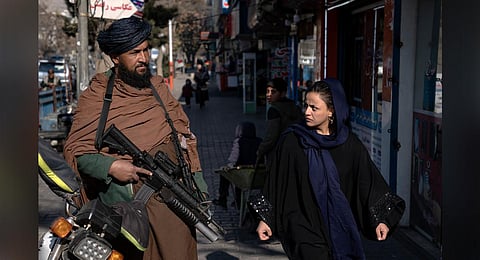

Afghanistan is poised dangerously on the edge of a precipice even as the world attempts to lend a helping hand, sans resources. The intent may be there, not the means.
Or is it another round of the Great Game being played in Central Asia for centuries?
Asserting that it is the largest humanitarian crisis in the world today, UN Secretary-General Antonio Guterres said in Doha on May 2, “It is difficult to overestimate the gravity of the situation in Afghanistan.”
The Secretary-General hosted a meeting of special envoys on Afghanistan in Qatar’s capital on May 1-2 to reach points of “commonality on key issues”. Such issues include human rights – in particular women's and girls' rights, inclusive governance, countering terrorism and drug trafficking, etc.
Taliban not invited
Envoys represented almost two-dozen countries in the meeting. Among those present were from India, China, Pakistan, Iran, the Russian Federation, Saudi Arabia, UAE, the United Kingdom, US, the European Union, and the Organisation of Islamic Cooperation.
However, the Taliban – currently in power in Kabul – was not invited. The UN General Assembly has declined its request for credentials. The Taliban has been seeking world recognition for itself and stepped-up PR exercise last year on its first anniversary since assuming power on August 15, 2021.
Most nations and rights organisations have shown solidarity with women protesting over Taliban atrocities and strongly condemned the administration.
With the Taliban not being part of the Doha meeting, Stéphane Dujarric, the spokesman for the Secretary-General, was asked how the outcome of the meeting could make a difference on the situation in Afghanistan.
“You know, God knows we’re not in the business of ensuring anything. We’re in the business of being determined and of continuing to work in trying to coordinate the actions of the international community for singularity of purpose, for the sake of the people of Afghanistan, notably for women and girls in Afghanistan,” answered Dujarric.
In January, Deputy Secretary-General, Amina Mohammed, the Executive Director of UN Women, Sima Bahous, and the Assistant Secretary-General for UN political, peacebuilding and peace operations, Khaled Khiari, spent four days on a fact-finding mission in Afghanistan, to engage with Taliban leaders, and “underscore UN solidarity with the Afghan people”, said a press release.
Funds drying
Guterres reiterated the sad state of affairs in the country, revealing that the Humanitarian Response Plan, seeking $4.6 billion, has received a mere $294 million. This amount, he added, was 6.4 per cent of the total funding required.
Looking for their manna are about six million Afghan children, women, and men, who are, according to the UN Secretary-General, “one step away from famine-like conditions”.
Ninety-seven percent of Afghans live in poverty. Two-thirds of the population (about 28 million) will need humanitarian assistance this year to survive. But funding is evaporating.
Because Afghanistan and its people are no more a concern, except perhaps for its immediate neighbours.
China, Pakistan in the game
Incidentally, on the day the UN Secretary-General was addressing the media in Doha, reports said that a UN Security Council committee has agreed to allow the Taliban’s interim foreign minister, Mawlawi Amir Khan Muttaqi, to travel to Pakistan from Afghanistan to meet with Pakistani and Chinese counterparts.
China and Pakistan are now keen to strengthen ties with the Taliban and have been extending economic and logistical support to woo them. However, the Afghan Taliban are still at loggerheads with its Pakistani counterpart. China aims to ensure that the Taliban eliminates Uyghur militant groups operating in Afghanistan.
Meanwhile, according to an Aljazeera report, Muttaqi has long been subjected to a travel ban, asset freeze and arms embargo under UN Security Council sanctions.
The report added that the UN Security Council committee “agreed to allow Muttaqi to travel to Uzbekistan last month for a meeting of the foreign ministers of neighbouring countries of Afghanistan to discuss urgent peace, security, and stability matters”.
Food shortage
Another Al Jazeera report in April said that the World Food Programme (WFP) has warned that if donors do not pledge new funds, the agency will not have the resources to carry out any food assistance by June.
“Our food distributions will drop from 13 million people in March to nine million people in April and five million people in May down to zero in June and onwards,” Philippe Kropf, the head of communications at WFP, told Al Jazeera.
“The country is at the highest risk of famine in a quarter of a century and WFP’s food assistance is the last lifeline for millions of Afghans,” Hsiao-Wei Lee, WFP country director in Afghanistan, said in a statement last month.
Web Scrawl | Read our series of web exclusives here
The clock is ticking for the Afghans. They need material help, not lip service. But without the Taliban shedding fanaticism and learning governance, that may take time.
The UN Secretary-General was asked at his briefing on Tuesday about the next step for the international community regarding Afghanistan.
“There are several initiatives going on, but I have agreed to convene another meeting in the near future, where we will be able to use this platform as a platform where so many different initiatives are coming together,” he answered.